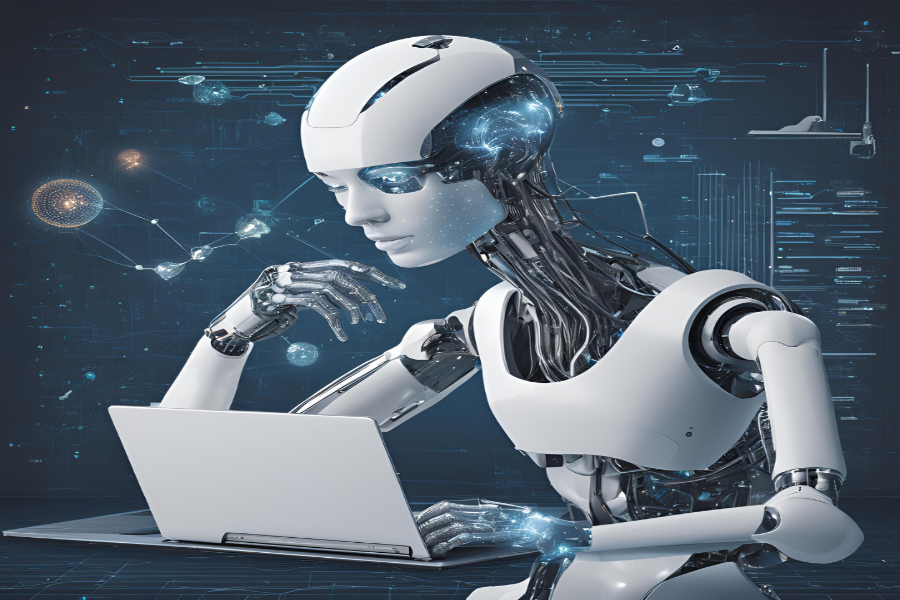Artificial Intelligence (AI) is revolutionizing industries worldwide, transforming the way businesses operate and fundamentally changing the job market. While AI promises increased efficiency and innovation, it also raises concerns about job displacement and the future of work. Understanding AI’s impact on jobs is crucial for workers, employers, and policymakers as they adapt to this rapidly evolving landscape.
The Evolution of Artificial Intelligence
AI has come a long way from its early days of basic machine learning and rule-based systems. Today, AI encompasses advanced algorithms capable of processing massive amounts of data, recognizing patterns, and making autonomous decisions. These advancements have enabled AI to be integrated into various sectors, from healthcare and finance to manufacturing and retail, profoundly influencing the job market.
AI and Job Automation
Job automation is one of the most significant ways AI is impacting employment. Automation involves using AI to perform tasks that were traditionally done by humans, often with greater speed and accuracy. Industries like manufacturing, retail, and customer service have seen a surge in AI-driven automation. For example, in manufacturing, AI-powered robots are used for assembly lines, reducing the need for manual labor. Similarly, in retail, AI chatbots are handling customer inquiries, decreasing the reliance on human customer service representatives.
Jobs at Risk: Who is Most Affected?
Certain jobs are more vulnerable to AI-driven automation than others, particularly those involving repetitive, routine tasks. Jobs in manufacturing, data entry, and retail are at higher risk of being replaced by AI. Workers in low-skill positions are especially susceptible, as their roles often involve tasks that AI can perform more efficiently. However, even high-skill jobs are not entirely immune, with AI increasingly capable of handling complex tasks in fields like finance and law.
AI Creating New Job Opportunities
While AI is automating certain jobs, it is also creating new opportunities. The rise of AI has generated demand for roles such as AI specialists, data scientists, and AI ethics consultants. These positions require a high level of technical expertise and are often in fields related to AI development, deployment, and governance. Moreover, AI is enabling the creation of new industries and business models, leading to job growth in areas previously unexplored.
The Role of Education and Skill Development
As AI continues to reshape the job market, education and skill development have become increasingly important. To remain competitive, workers must acquire new skills that complement AI technologies. Upskilling and reskilling programs are essential, providing workers with the knowledge and tools they need to thrive in an AI-driven economy. Educational institutions and governments are beginning to offer specialized programs and certifications focused on AI-related skills, helping to bridge the gap between current capabilities and future demands.
Ethical Considerations in AI Job Displacement
The ethical implications of AI-driven job displacement are a significant concern. As AI replaces human workers, questions arise about the responsibility of companies and governments to manage this transition. Ethical considerations include the potential loss of livelihoods, the widening income gap, and the societal impact of widespread job displacement. Solutions such as universal basic income and retraining programs are being explored to mitigate these effects and ensure that the benefits of AI are shared broadly.
AI and the Gig Economy
AI is also influencing the gig economy, where freelance and contract work is prevalent. AI tools are empowering gig workers by automating administrative tasks, optimizing work schedules, and providing new platforms for finding work. However, the gig economy is not immune to the challenges posed by AI, as automation could also reduce the demand for certain types of gig work. The future of the gig economy will likely involve a combination of AI-enhanced work and continued adaptation to AI-driven changes.c
AI in the Global Job Market
AI’s impact on jobs is not uniform across the globe. Developed countries, with their advanced technological infrastructures, are more likely to benefit from AI, creating new high-tech jobs and increasing productivity. In contrast, developing countries may face greater challenges, as their economies often rely on low-skill, labor-intensive jobs that are more susceptible to AI-driven automation. This disparity could exacerbate global economic inequalities unless addressed through international cooperation and targeted policy interventions.
Case Studies: Companies Leading the AI Revolution
Several companies are at the forefront of integrating AI into their operations, serving as examples of how AI can be leveraged effectively. For instance, Amazon uses AI for everything from optimizing its supply chain to enhancing customer recommendations. Similarly, companies like Tesla are using AI to develop autonomous vehicles, revolutionizing the automotive industry. These case studies demonstrate the potential of AI to drive innovation and growth, but they also highlight the need for thoughtful management of AI’s impact on the workforce.c
The Future of Work: AI and Human Collaboration
The future of work will likely involve greater collaboration between humans and AI. Rather than replacing humans entirely, AI can augment human capabilities, enabling workers to focus on more creative and strategic tasks. For example, in healthcare, AI can assist doctors by analyzing medical data, allowing them to make more informed decisions. In the creative industries, AI tools can help designers and artists by generating ideas and optimizing workflows. This symbiotic relationship between AI and human workers will define the future of work, emphasizing the importance of adaptability and continuous learning.
Preparing for an AI-Driven Job Market
To prepare for an AI-driven job market, workers, businesses, and governments must take proactive steps. For workers, this means embracing lifelong learning and being open to acquiring new skills. Businesses should invest in training programs that help employees transition into new roles created by AI. Governments must play a crucial role by developing policies that support job creation, protect vulnerable workers, and ensure that the benefits of AI are widely shared. By working together, these stakeholders can create a future where AI enhances the quality of work and life for everyone.
Government and Policy Responses
Governments around the world are beginning to recognize the impact of AI on jobs and are developing policies to manage this transition. These policies include investments in education and training, support for research and development, and social safety nets for displaced workers. Some governments are also exploring more radical approaches, such as universal basic income, to address the potential for widespread job displacement. International cooperation will be essential in addressing the global challenges posed by AI, ensuring that all countries can benefit from its advancements.
CONCLUSION: Artificial Intelligence is reshaping the job market in profound ways, presenting both challenges and opportunities. While AI-driven automation poses a risk to certain jobs, it also creates new roles and industries that can drive economic growth. The key to navigating this transition lies in education, ethical considerations, and proactive adaptation by all stakeholders. By embracing AI and preparing for its impact, we can create a future where technology enhances our lives and work in meaningful ways.
FAQs
Jobs involving repetitive, routine tasks, such as those in manufacturing, retail, and data entry, are most at risk. However, even some high-skill jobs in fields like finance and law could be impacted by AI.
AI has the potential to create more jobs than it eliminates by generating new roles in AI development, data science, and other tech-related fields. However, this requires a workforce that is willing and able to adapt to these changes.
Governments can manage AI’s impact by implementing policies that support education and training, protect workers, and encourage responsible AI development. International cooperation is also crucial in addressing the global implications of AI on employment.
Workers can prepare by acquiring new skills, particularly in areas that complement AI technologies. Lifelong learning and staying updated with industry trends are crucial for remaining competitive.
Companies can integrate AI ethically by investing in retraining programs, offering support for displaced workers, and ensuring that AI is used to augment rather than replace human capabilities.









19 Comments
Your comment is awaiting moderation.
It’s so important to remember gaming should be fun, not a source of stress. Seeing platforms like 68wim apk prioritize easy registration & secure play is a good sign – responsible enjoyment matters! Let’s all play it safe. 😊
Your comment is awaiting moderation.
It’s great seeing platforms prioritize a smooth, secure experience! Tech like JLJL55’s fast registration & AI-powered recommendations could really help players stay in control. Check out the jljl55 ph app – responsible gaming & innovation seem to go hand-in-hand there! 😊
Your comment is awaiting moderation.
Interesting analysis! Seeing patterns is key, even in games of chance. Platforms like jlboss are gaining traction with diverse game options – verification steps seem standard for security, which is good to see! It’s all about informed fun.
Your comment is awaiting moderation.
Interesting read! Seeing a lot of discussion around online gaming trends in the Philippines. Heard good things about the user experience on platforms like phlwin app download apk – smooth login is key! Hoping for responsible gaming practices across the board.
Your comment is awaiting moderation.
Interesting analysis! Seeing platforms like 68wim login really push tech integration with local culture is smart. Streamlined registration sounds key for user experience – a big win for Vietnamese players! 👍
That underwater world in Happy Fish sounds intense! Skill-based shooting and slot excitement? Sign me up! Seriously considering checking out Happy Fishing – mastering that aim is key, right? 😄
Lovart sounds like a game-changer for designers-it’s impressive how it bridges AI and traditional tools. The tri-modal interaction could really streamline creative workflows. I’ll definitely keep an eye on Lovart as it evolves!
Great insights on risk management in online gambling! Platforms like JiliOK 777 offer smart tools that help players make more informed decisions, especially with their AI-driven gameplay analysis.
Great insights on roulette probabilities! It’s fascinating how game platforms like Jili Online use similar statistical models to balance odds and player experience across their diverse slot and live dealer games.
That’s a fascinating point about user engagement! It’s amazing how psychology plays into even simple online interactions. I was checking out sz777 log in and their streamlined registration is really clever – makes it so easy to jump in and explore! Definitely a smooth user journey.
Interesting read! Understanding game mechanics is key to enjoying slots – PHLWin Super Ace seems to really focus on that. Check out their insights via phlwin link – could help strategize! It’s cool they cater to Vietnamese players too.
Really insightful article! Starting with basic strategy is key, and platforms like 789bet link seem to prioritize a smooth onboarding process – important for new players navigating account setup & funding! Great read.
Understanding bankroll management is key in baccarat, and a smooth platform experience helps! Discovering optimal service access, like through PH222 Login, can really streamline things & focus your strategy. Operational excellence matters!
Interesting points about bankroll management! Seeing a well-structured platform like PH222 login app emphasizes smooth access-key for consistent strategy. Operational excellence really matters in this game.
Scratch cards are fun, but JLJLPH takes it up a notch with live dealers and slots! Their easy sign-up and secure process make it a breeze to start playing. Try JLJLPH for a next-level gaming experience.
Sprunki Incredibox is a fresh twist on a beloved classic-adding new beats, visuals, and creativity without losing the fun. Check out the Sprunki Phase Game for a next-level musical experience!
Interesting analysis! Strategic play is key, and understanding game mechanics – like those highlighted on Plus777 log in – can definitely give you an edge. Seems like a solid platform for exploring different approaches!
It’s fascinating how platforms now use behavioral psychology to enhance user experience – seeing that in action with streamlined registration is clever! Considering how easily we get hooked, responsible gaming is key. Check out SZ777 casino login for a look at their approach. 🤔
It’s fascinating how platforms like Jili777 blend accessibility with variety, offering everything from slots to live dealer games. The ease of use really stands out for new players.
Interesting read! Platform security is often overlooked. Seeing a focus on service, like with PH Login Win, is a smart move – responsive support builds trust, crucial for any online experience. Good points!
Great insights! For those looking to explore online gaming, platforms like SuperPH offer a seamless mix of slots, live dealers, and immersive experiences worth checking out.
This really resonates! Just like AI Tools, these AI Tools push boundaries.
Outstanding insights! Sprunki transforms how we think about musical creativity. Sprunki offers unprecedented creative potential in composition. The way Sprunki empowers creative expression is truly remarkable.
Undeniably believe that which you stated. Your
favorite justification appeared to be on the internet the easiest thing to be aware of.
I say to you, I definitely get irked while people consider worries
that they plainly do not know about. You managed to hit the nail upon the top as well as
defined out the whole thing without having side-effects , people can take a signal.
Will probably be back to get more. Thanks!